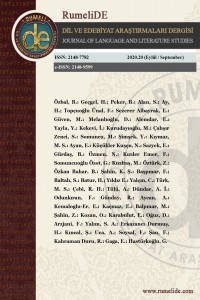Abstract
Yemek çalışmalarının çok disiplinli ve kültürlerarası araştırmaların en ilgi çekici konularından biri olmasına rağmen, yemek kavramı üzerinde çeviri çalışmaları kapsamında beklendiği kadar çalışma yapılmamıştır. Kültürü temsil eden unsurlardan biri olarak yemek, dil vasıtasıyla yolculuk yapar ve yemeğin hedef kültür tarafından kabul edilmesinde ya da reddedilmesinde çevirinin büyük katkısı vardır. Bu çalışma, çeviri ekolojisinden ve çeviri ekolojisi ile yemek ekolojisi arasındaki ilişkiden yola çıkarak yemek unsurlarının küreselleşmesinde ya da yerel kalmasında çevirmenlerin çeviri süreçlerinde benimsedikleri stratejilerin etkisini göstermeyi amaçlamaktadır. Bunun için Türkiye’nin güneydoğusunun mutfak kültürünü temsil eden bir şehir olan Diyarbakır’da geçen ve en çok satan modern Türk eserlerden biri olan Piraye adlı romandaki yemek unsurlarının çevirisi incelenmiştir. Rastgele seçilen örneklerin analizinde, çevirmenin açıklama, dipnot, çıkarma ve ekleme gibi stratejileri kullanarak kendisini konumlandırma biçimi gözlemlenmiştir. Çalışma, genel olarak, çeviri ekolojisi çerçevesinde çevirmenin baskın rolünü, özellikle de mutfak kültürünün göç edici doğasını vurgulayarak yemek unsurlarının aktarımı sürecinde çevirmenin önemli katkılarını göstermektedir.
Keywords
Çeviri ekolojisi yemek ekolojisi mutfak kültürü çeviri stratejileri çevirmenin kendini konumlandırması
References
- Chiaro, D. & Rossato, L. (2015). Food and Translation, Translation and Food. The Translator, 21(3), 237-243.
- Cronin, Michael. (2017). Eco-Translation Translation and Ecology in the Age of the Anthropocene. London and New York, Routledge.
- Hu, G. S. (2004). An Approach to Translation as Adaptation and Selection. Hubei Education Press, Wuhan.
- Hu, G. S. (2008). Eco-Translatology: A Primer. Chinese Translators Journal, 6, 11-15.
- Hu, G. S. (2011). Eco-Features of Eco-Translatology and The Implications to Translation Studies. Foreign Languages in China, 6, 96-109.
- Hu, G. S. and Tao, Y. (2016). Eco-Translatology: A New Paradigm of Eco-translation -A Comparative Study on Approaches to Translation Studies. Sociology, 115-132.
- Montanari, M. (2004). Food is Culture. New York, Columbia University Press.
- Oster, Ulrike. Cases-Moles, Teresa. (2016). Eating And Drinking Seen Through Translation: A Study of Food-related Translation Difficulties and Techniques in a Parallel Corpus of Literary Texts. Across Languages and Cultures, 17 (1), 53-75.
- Tan, Canan (2004). Piraye, İstanbul: Doğan Kitap................
- Tan, Canan. (2012). Piraye- The Bride of Diyarbakır. İstanbul: Altın Kitaplar.
- Venuti, L. (1995). The Translator‘s Invisibility: A History of Translation. London & New York: Routledge.
- Wang, F. An Eco-Translatology Approach to the English Translation of Chinese Internet Catchwords. Open Journal of Social Sciences, 02(10): 52-61
Abstract
Despite the multidisciplinary nature of food studies and its being one of the most interesting subjects among cross-cultural research, the concept of food has not been dwelled upon as it is expected within the translation studies. As a representative of culture, food is traveling through language and translation has a significant effect either on its adoption or rejection by the target culture. Moving from the background of translation ecology and its interaction with food ecology, this study aims to reveal the effect of translators in the globalization of the food items or making them stay local through their strategies adopted in the translation process. In order to do so, the English translations of the food items in one of the best-selling Turkish modern novels, Piraye, were investigated, as it is set in Diyarbakır, a representative city of the culinary culture of the South-eastern part of Turkey. During the data analysis of the randomly selected samples, the self-positioning of the translator was observed with the use of the strategies such as explanations, footnotes, omission, and addition. This study reveals in a general sense the dominant role of the translator within the frame of translation ecology and more specifically, his effective contribution to the process of the transfer of food items foregrounding the migratory nature of the culinary cultures.
Keywords
Translation ecology food ecology culinary culture translation strategies self-positioning of translators.
References
- Chiaro, D. & Rossato, L. (2015). Food and Translation, Translation and Food. The Translator, 21(3), 237-243.
- Cronin, Michael. (2017). Eco-Translation Translation and Ecology in the Age of the Anthropocene. London and New York, Routledge.
- Hu, G. S. (2004). An Approach to Translation as Adaptation and Selection. Hubei Education Press, Wuhan.
- Hu, G. S. (2008). Eco-Translatology: A Primer. Chinese Translators Journal, 6, 11-15.
- Hu, G. S. (2011). Eco-Features of Eco-Translatology and The Implications to Translation Studies. Foreign Languages in China, 6, 96-109.
- Hu, G. S. and Tao, Y. (2016). Eco-Translatology: A New Paradigm of Eco-translation -A Comparative Study on Approaches to Translation Studies. Sociology, 115-132.
- Montanari, M. (2004). Food is Culture. New York, Columbia University Press.
- Oster, Ulrike. Cases-Moles, Teresa. (2016). Eating And Drinking Seen Through Translation: A Study of Food-related Translation Difficulties and Techniques in a Parallel Corpus of Literary Texts. Across Languages and Cultures, 17 (1), 53-75.
- Tan, Canan (2004). Piraye, İstanbul: Doğan Kitap................
- Tan, Canan. (2012). Piraye- The Bride of Diyarbakır. İstanbul: Altın Kitaplar.
- Venuti, L. (1995). The Translator‘s Invisibility: A History of Translation. London & New York: Routledge.
- Wang, F. An Eco-Translatology Approach to the English Translation of Chinese Internet Catchwords. Open Journal of Social Sciences, 02(10): 52-61
Details
| Primary Language | English |
|---|---|
| Subjects | Linguistics |
| Journal Section | Translation and interpreting |
| Authors | |
| Publication Date | September 21, 2020 |
| Published in Issue | Year 2020 Issue: 20 |

